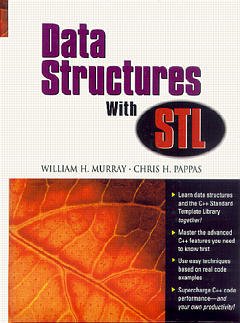Data structures with STL
Langue : Anglais
Auteurs : MURRAY William, PAPPAS Chris

When you understand data structures, you can command many of the most powerful, efficient algorithms ever created! Better yet, the C++ Standard Template Library bundles dozens of these advanced algorithms in a simple, reliable, easy-to-use form. Now, you can learn data structures and STL together, with the first book that teaches them both: Data Structures With STL.KEY TOPICS:Renowned programming instructors William Murray and Chris Pappas begin with the intermediate-to-advanced C++ features you need to know first, including namespaces, void * pointers, generic types, and template development. Then, using extensive code examples, they introduce every aspect of working with data structures and STL. Understand the STL extensible framework and components, learn how to utilize containers, iterators, and algorithms, and work with dynamic memory allocation and deallocation. Master STL-based portable solutions for array creation, element insertion/deletion, sorting, element output, and seamlessly integrate iostreams and exception handling. STL can optimize the performance and reliability of all your C++ code -- and dramatically enhance your own productivity, too. Data Structures With STL shows you how -- more simply and easily than you ever thought possible.MARKET:For all intermediate-level C++ programmers seeking to enhance their skills and productivity.
1. Easing into Standard Template Library (STL) Using Arrays STL Vector.
2. Lists STL List.
3. Stacks and Queues STL Adaptors.
4. Double-Ended Lists STL Deque.
5. Sets STL Sets and Multisets.
6. Binary Trees.
What Do I Need to Know to Use This Book? Why Do I Need Calculus When I Can Buy a Calculator? The Complexity of Multiplatform Target Environments. Unintentional Misuse or Ignorance of C/C++ Features. Data Structures The Course to Separate Hackers from Pros! So, Just What Is the Standard Template Library? The Origins of STL. What Do I Need to Know to Take Advantage of STL? A High-Level View of STL. Kudos to the ANSI/ISO C++ Committee. STLs Tri-Component Nature. Latest C++ ANSI/ISO Language Updates. Using namespace. namespace Syntax. The using namespace Statement. The Selective using Statement. Renaming namespaces. static File Scope vs Unnamed namespaces. New Casting Operations. Dynamic Casting. Static Casting. Newer C-Type Cast. Constant Cast. Run-Time Type Information (RTTI). Introduction to the Standard C++ Library. The Standard C++ Libraries. Your First Standard C++ Library Application. Implementing Your Own Template. Your First class Template. Function Templates Requirements. Using a Class Template. Class Template Parameters. Default Template Parameters. The Standard Template Library. STL Components. Rules for Using STL. Function Objects. STL Function Objects. STL Function Adapters. Standard Template Library Algorithms. Standard C++ Library Language Support. cstddef. Implementation Properties: limits, climits, cfloat. Exception Handling. Additional Support. STL Review. Sample Code. The find.cpp Application. The rndshfl.cpp Application. The removif.cpp Application. The setunon.cpp Application. Conclusion.
2. Lists STL List.
Lists Using Arrays. Constructing an Array of Structures. Dynamic Memory Allocation Linked Lists. Considerations When Using Linked Lists. A Simple Procedural Linked List. An Object-Oriented Linked List in C++. Creating a Parent Class. A Derived Child Class. Using a Friend Class. Examining the Complete Program. Linked-List Output. Lists Using STL. Vector. List. STL Vector Versus List Efficiency. Summary.
3. Stacks and Queues STL Adaptors.
Dynamic Arrays. Making Vectors Data-Type Specific. How To Instantiate a Vector. An Example Using Vector Template Functions. Referencing Single Elements. Adding and Deleting Elements. Determining the Size of a Vector Container. Using the Template with Vectors. Example Programs. The ADT Stack. Creating a Stack Using an Array. Pushing Elements onto a Stack. Popping Elements from a Stack. Viewing the Top Element of a Stack. The STL Stack. STL Defines Stacks and Queues as Adaptors. Template Syntax. Template Overloaded Operators. Template Methods. Example Program. The ADT Queue. Creating a Queue Using an Array. Inserting Elements into a Queue. Removing Elements from a Queue. Viewing the Front Element of a Queue. The STL Queue. Template Syntax. Template Methods. Example Programs. Summary.
4. Double-Ended Lists STL Deque.
Object-Oriented Deques. Deque Operations. The Template. The Template Syntax. Overloaded Operators. Template Methods. Sample Code. The arrayDQ.cpp Application. The vectorDQ.cpp Application. The dequeDQ.cpp Application. The deque.cpp Application. Summary.
5. Sets STL Sets and Multisets.
Binary Sequences and the Template. Template Syntax. Template Overloaded Operators. Template Methods. Sample Code. Sets and Multisets Using the and Templates. The and Template Syntax. The and Template Functions. The Template Methods. and Sample Code. Summary.
6. Binary Trees.
Dynamic Linked List Fundamentals. The Container. Template Syntax. allocator_type. size_type. difference_type. reference. const_reference. value_type. iterator. const_iterator. reverse_iterator. const_reverse_iterator. Template Methods. Sample Code. The list1.cpp Application. The list2.cpp Application. The list3.cpp Application. Recursive Calls and the Call Stack. View Disassembly Code. The Big-O Function. Binary Tree Fundamentals. STL
Date de parution : 01-2001
Ouvrage de 414 p.
18x24 cm
Thème de Data structures with STL :
© 2024 LAVOISIER S.A.S.



